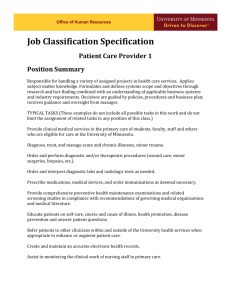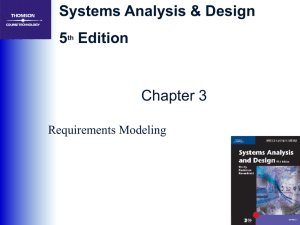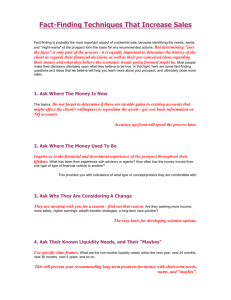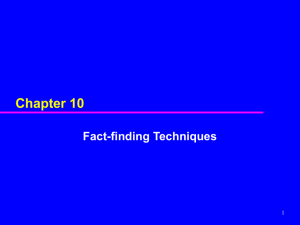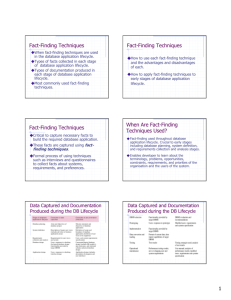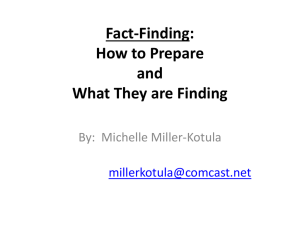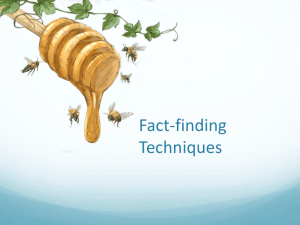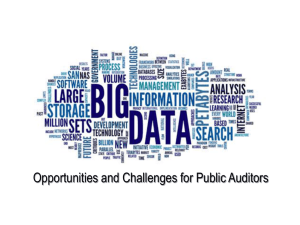International Human Rights Clinic
advertisement
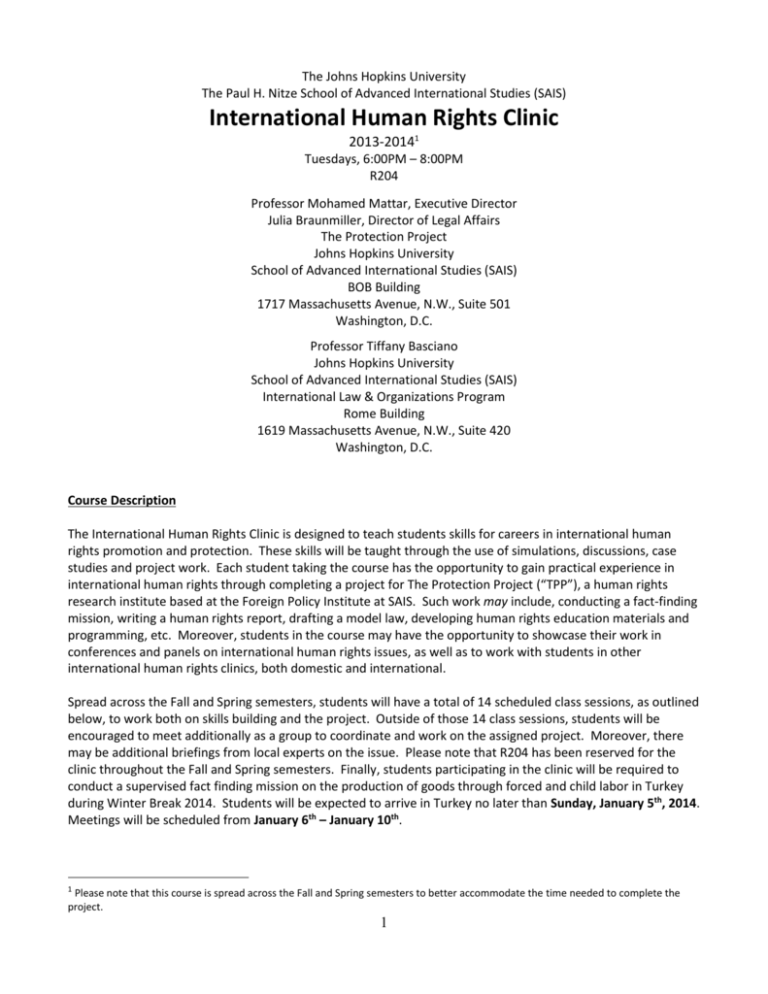
The Johns Hopkins University The Paul H. Nitze School of Advanced International Studies (SAIS) International Human Rights Clinic 2013-20141 Tuesdays, 6:00PM – 8:00PM R204 Professor Mohamed Mattar, Executive Director Julia Braunmiller, Director of Legal Affairs The Protection Project Johns Hopkins University School of Advanced International Studies (SAIS) BOB Building 1717 Massachusetts Avenue, N.W., Suite 501 Washington, D.C. Professor Tiffany Basciano Johns Hopkins University School of Advanced International Studies (SAIS) International Law & Organizations Program Rome Building 1619 Massachusetts Avenue, N.W., Suite 420 Washington, D.C. Course Description The International Human Rights Clinic is designed to teach students skills for careers in international human rights promotion and protection. These skills will be taught through the use of simulations, discussions, case studies and project work. Each student taking the course has the opportunity to gain practical experience in international human rights through completing a project for The Protection Project (“TPP”), a human rights research institute based at the Foreign Policy Institute at SAIS. Such work may include, conducting a fact-finding mission, writing a human rights report, drafting a model law, developing human rights education materials and programming, etc. Moreover, students in the course may have the opportunity to showcase their work in conferences and panels on international human rights issues, as well as to work with students in other international human rights clinics, both domestic and international. Spread across the Fall and Spring semesters, students will have a total of 14 scheduled class sessions, as outlined below, to work both on skills building and the project. Outside of those 14 class sessions, students will be encouraged to meet additionally as a group to coordinate and work on the assigned project. Moreover, there may be additional briefings from local experts on the issue. Please note that R204 has been reserved for the clinic throughout the Fall and Spring semesters. Finally, students participating in the clinic will be required to conduct a supervised fact finding mission on the production of goods through forced and child labor in Turkey during Winter Break 2014. Students will be expected to arrive in Turkey no later than Sunday, January 5th, 2014. Meetings will be scheduled from January 6th – January 10th. 1 Please note that this course is spread across the Fall and Spring semesters to better accommodate the time needed to complete the project. 1 Prior Coursework Students are encouraged to have taken one of the following courses: International Protection of Human Rights (650.736); International Human Rights (650.755); Multiculturalism & the Human Rights of Women (650.729). However, enrollment in these courses is not a prerequisite. Clinic Application Process Second year students in the International Law & Organizations Program may be given some preference, but all are encouraged to apply. Students are asked to submit: 1) a one page statement of interest discussing why they would like to participate in the clinic and how they hope to benefit from and contribute to the clinic; and 2) a résumé or CV highlighting any experiences that may be relevant. Applications will be due on Friday, August 16th and should be submitted to the International Law & Organizations Program, saisilo@jhu.edu. Selected students will be notified before the close of registration. If there are still seats open after the application deadline, then additional applications will be accepted on a rolling basis. Assessment Grading will be assessed as follows: Participation – 10% o Participation counts towards 10% of the overall grade. Attendance will be recorded. Please show up to all scheduled class sessions on time and prepared for the assigned topic. If there is an extenuating circumstance, and you cannot attend class on a particular day, please let us know in advance. Victim Interview Simulation – 10% o The Victim Interview Simulation counts towards 10% of the overall grade. Each student will be assigned both a mock victim role and a mock interviewer role to facilitate the simulation. The grade will be based on each interviewer’s ability to apply discussed interviewing techniques in a hypothetical situation. Fact-Finding Mission – 20% o The fact-finding mission counts towards 20% of the overall grade. The students will conduct background research on the issues, identify key stakeholders, assist in arranging meetings, and conduct meetings and interviews with the various stakeholders. The grade will be based on each student’s work in preparing for and executing the fact-finding mission, including ability to apply fact-finding concepts discussed in class. Report – 50% o The report will count towards 50% of the overall grade. The students will work on the report on the production of goods through forced and child labor in Turkey as a group, outlining their findings and recommendations based on background research and the fact finding mission. The report will be published. Presentation & Release of Report to SAIS Community, General Public, and Media – 10% o The project presentation counts towards 10% of the overall grade. The students will organize the presentation as a group with each individual presenting for 5 – 7 minutes. The course instructors will provide a general overview of the projects to the audience. The grade will be based on form and substance of the presentation. 2 Office Locations & Contact Information The Protection Project is located in BOB, Suite 501. Professor Mohamed Mattar, Executive Director of The Protection Project, may be reached at mmattar@jhu.edu or 202-663-5887. The Director of Legal Affairs at The Protection Project, Julia Braunmiller may be reached at jcbraunmiller@jhu.edu or 202-665-5939. The International Law & Organizations Program is located in Rome, Suite 420. Professor Tiffany Basciano may be reached at tbascia1@jhu.edu or 202-663-5982. Texts The following text is required: Hurst Hannum ed., Guide to International Human Rights Practice [paperback](4th ed. 2004) ISBN-10 1571050639 Other readings will be accessible via electronic reserve (Eres) Clinical Project – Report on the Production of Goods through Forced and Child Labor in Turkey This semester students will work on a report regarding the production of goods through forced and child labor in Turkey. Students will research the issue, the relevant international and domestic legal regimes, responses and programs from the government, IGOs, and NGOs. The report will outline the students’ findings and recommendations based on background research and the fact finding mission. The project will follow the schedule as detailed below. Students will be responsible for all stages of the project: identifying key stakeholders (government officials, IGOs, NGOs, individuals, etc.); assisting in the arrangement of interviews and briefings; conducting background research on the issues in preparation for the fact-finding mission; participating in the fact-finding mission; outlining, drafting and finalizing the report; and presenting the report to the SAIS Community, General Public and Media. The Protection Project will book and cover the round trip airfare and the in country ground transportation for the fact-finding mission. Students will be responsible for all other expenses. However, the instructors will help identify low cost or even free lodging options (e.g., a university dormitory) to the extent possible. OCTOBER 8TH – Identify Stakeholders & Division of Background Research o Discuss Scheduling of Interviews and Briefings o Discuss Division and Sources for Background Research List of Key Stakeholders Due, October 22nd NOVEMBER 19TH – Background Research o Discussion of Background Research in Class o Develop a list of questions List of Questions Due, December 3rd DECEMBER 3RD – Finalize Details for the Fact-Finding Mission o Finalize list of questions January 6th – 10th – Fact-Finding Mission January 28th Evaluate Information Collected During the Fact Finding Missions o Conducting Follow Up 3 o o Corroborating Research Outline Report Outline of Report Due, February 14th February 18th Report Writing Draft Report Due, March 7th th March 11 Discussion of Draft Report Final Report Due, April 1st th April 29 Present Report Submitting Written Work Please submit written work by email to all the course instructors (email addresses are listed above) as Word documents. Assignments are due by close of business on the date listed. If there is an extenuating circumstance, an extension may be requested. Late assignments may be penalized. Honor Code Statement Enrollment at SAIS obligates each student to conduct all activities in accordance with the rules and spirit of the school’s Honor Code. The Honor Code governs student conduct at SAIS. It covers all activities in which students present information as their own, including written papers, examinations, oral presentations and materials submitted to potential employers or other educational institutions. It requires that students be truthful and exercise integrity and honesty in their dealings with others, both inside SAIS and in the larger community. While the Honor Code goes well beyond plagiarism, it is important that each student understand what is and what is not plagiarism. The Turnitin software is available to faculty in detecting plagiarism. Plagiarism will definitely result in failure of the paper or exam and may result in failing the course depending on the judgment of the professor. Course Schedule CLASS 1 – SEPTEMBER 3RD – INTRODUCTION Course Overview Course Requirements Introduction to the Project o Scope of the Issue Readings: U.S. Department of Labor’s 2010 Findings on the Worst Forms of Child Labor, Section on Turkey, http://photos.state.gov/libraries/ankara/9104/PDF%20Files%20for%20E-Alert/2010tda.pdf U.S. Department of Labor’s List of Goods Produced by Child Labor or Forced Labor, 2012, http://www.dol.gov/ilab/programs/ocft/2012TVPRA.pdf (See Turkey) CLASS 2 – SEPTEMBER 10TH – OVERVIEW OF INTERNATIONAL HUMAN RIGHTS LAW What is an International Human Right? o Categories of Human Rights 1st generation (blue); 2nd generation (red); 3rd generation (green) o Cultural Relativism Are human rights universal? Should human rights be universal? “Margin of Appreciation” Handyside v. United Kingdom (ECHR) o Interdependence of Human Rights 4 Does the right to vote have any meaning, if one cannot read (right to an education)? Core International Human Rights Treaties ICCPR, ICESCR, CERD, CEDAW, CAT, CRC, CMW, CRPD o Regional Human Rights Instruments ECHR, ACHPR, ACHR Arab Charter ASEAN Human Rights Declaration Architecture of the International Human Rights System o UN Human Rights Procedures UN Human Rights Council Universal Periodic Review Special Procedures Complaint Procedure o UN Treaty Bodies Committees that Adjudicate Complaints Human Rights Committee (ICCPR) CEDAW Committee CERD Committee CAT Committee CRPD Committee ESCR Committee CMW Committee o European System o Inter-American System o African System o Arab System o ASEAN Working Group on Human Rights Mechanism o Domestic Judicial Systems Readings: o Hurst Hannum, Chapter 1, An Overview of International Human Rights Law, 3 – 18 o Hurst Hannum, Chapter 2, Implementing Human Rights: An Overview of NGO Strategies and Available Procedures, 19 – 39 o Henry J. Steiner, Philip Alston, Ryan Goodman, International Human Rights in Context: Law Politics Morals (3rd ed. 2008), Chapter 9 The United Nations Human Rights System, Part D The UN Human Rights Council 791 – 823. o Mohamed Mattar, Article 43 of the Arab Charter on Human: Reconciling National, Regional, and International Standards, Harvard Human Rights Journal, Volume 26, Spring 2013, http://www.protectionproject.org/wp-content/uploads/2013/07/Article-43-of-the-ArabCharter-on-Human-Rights_Dr.-Mohamed-Mattar_HHRJ_Spring-2013.pdf o CLASS 3 – SEPTEMBER 17TH – OVERVIEW OF FORCED & CHILD LABOR IN INTERNATIONAL LAW International Labor Organization o Minimum Age ILO Convention No. 138 o Worst Forms of Child Labour ILO Convention No. 182 o Concerning Forced or Compulsory Labour, No. 29 Convention on the Rights of the Child Readings: o Hurst Hannum, Chapter 5, Human Rights Complaint Procedures of the International Labor Organization, 89 – 106 5 CLASS 4 – OCTOBER 8TH – PROJECT DISCUSSION - IDENTIFYING STAKEHOLDERS FOR THE FACT FINDING MISSION & DIVISION OF BACKGROUND RESEARCH Students should be prepared to brainstorm and identify key stakeholders. Key stakeholders may include NGOs, IGOs, government officials, individuals, etc. Students will discuss and decide which stakeholders should be contacted to schedule interviews and briefings. Furthermore, students should be prepared to discuss topics for background research and division of the research. CLASS 5 – OCTOBER 22ND – HUMAN RIGHTS FACT FINDING & MONITORING Fact-Finding o Accuracy o Confidentiality o Impartiality o Gender-sensitivity Interviewing Victims Informed Consent Confidentiality Documenting o Reports o Record-Keeping Monitoring Readings: o David Weissbrodt, et.al International Human Rights Law, Policy and Process (3rd ed 2001), Chapter 9 International Human Rights Fact-Finding, 455 – 482; 502 – 511 o Amnesty International and CODESRIA, UKWELI: Monitoring and Documenting Human Rights Violations in Africa: A Handbook, (2000), http://www.hrea.org/erc/Library/Ukweli/ukweli-en.pdf o C. Zimmerman, WHO Ethical and Safety Recommendations for Interviewing Trafficked Women (World Health Organization, 2003) http://www.who.int/gender/documents/en/final%20recommendations%2023%20oct.pdf CLASS 6 – NOVEMBER 5TH IN CLASS SIMULATION – INTERVIEWING VICTIMS OF HUMAN RIGHTS VIOLATIONS CLASS 7 – NOVEMBER 19TH PROJECT DISCUSSION – PRESENTING AND DISCUSSING BACKGROUND RESEARCH ON THE PROJECT Students should be prepared to present and discuss their background research. Students will discuss and evaluate the background research with an eye towards areas for further background research and gaps in research to be addressed during the fact-finding missions. Students will develop a list of key questions and issues to explore during the fact-finding missions. CLASS 8 – DECEMBER 3RD PROJECT DISCUSSION – FINALIZING DETAILS FOR THE FACT-FINDING MISSION CLASS 9 – JANUARY 28TH PROJECT DISCUSSION – EVALUATION OF INFORMATION GATHERED DURING THE FACT-FINDING MISSION; BEGIN AN OUTLINE OF THE REPORT Students should be prepared to present and discuss the information that they gathered during the fact-finding mission. Students will evaluate the information with an eye towards areas for follow-up research and corroboration. Students will also begin to outline the report and decide on division of labor. 6 CLASS 10 – FEBRUARY 4TH REPORT WRITING & ADVOCACY TECHNIQUES: PERSUASIVE WRITTEN & ORAL ADVOCACY Persuasive Writing Techniques o Organization o Sentence Structure o Repetition o Quotations Some examples of Persuasive Writing o Letters to Policy Makers o Media (Op-Eds, Press Releases) Considerations o What is your advocacy objective? o Who is your targeted audience? Readings o A Sample Lobbying Letter http://www.icbl.org/index.php/icbl/What-You-Can-Do/Write-a-Lobbying-Letter/USALetter o Op-ed Jimmy Carter, “A Cruel and Unusual Record,” NY Times, June 24, 2012, http://www.nytimes.com/2012/06/25/opinion/americas-shameful-human-rightsrecord.html Persuasive Oral Advocacy Techniques o Know your audience o What do you want the audience to do? o Present illustrative examples o Specificity o Accuracy o Credibility o Simplicity o Consistency o Active Voice vs. Passive Voice o Style Tone Body language Pace Some examples of Persuasive Oral Presentations o Briefings before deliberative bodies o Launching reports o Testimony before legislative bodies o Hearings before tribunals CLASS 11 – FEBRUARY 18TH PROJECT DISCUSSION - REPORT WRITING Students should be prepared to continue discussing and writing the report. CLASS 12 – MARCH 11TH PROJECT DISCUSSION - DISCUSSION OF DRAFT REPORT Students should be prepared to discuss the draft report and respond to feedback. CLASS 13 – MARCH 25TH INTERNATIONAL HUMAN RIGHTS ADVOCACY TOOLS & STRATEGIES 7 Challenging Cultural Norms Community Education & Engagement Use of Social Media to Advance Human Rights Advancing Economic, Social and Cultural Rights Readings: o Bell, D. & Carens, J., “The Ethical Dilemmas of International Human Rights and Humanitarian NGOs: Reflections on a Dialogue Between Practitioners and Theorists,” Human Rights Quarterly 26 (2004) 300-329. http://muse.jhu.edu/journals/human_rights_quarterly/v026/26.2bell_d.pdf o Eric Tars, Who Knows What Lurks in the Hearts of Human Rights Violators? The Shadow (Reporter) Knows: Human Rights Shadow Reporting: A Strategic Tool for Domestic Justice, 42 Clearinghouse Rev. 475 (Jan./Feb. 2009). o “Using Social Media to Promote Human Rights,” Office of the High Commissioner on Human Rights (10 Aug. 2011). http://www.ohchr.org/EN/NewsEvents/Pages/InternetFreedom.aspx CLASS 14 – APRIL 29TH – PROJECT DISCUSSION - PRESENT REPORT Students should be prepared to present the final report at an event open to the SAIS Community, General Public, and Media. The students will organize the presentation as a group with each individual presenting for 5 – 7 minutes. The course instructors will provide a general overview of the projects to the audience. If schedules allow, we may ask that this event take place as a luncheon rather than the regularly scheduled class time in the evening. 8 International Human Rights Helpful Websites The Protection Project at The Johns Hopkins University SAIS • www.protectionproject.org American Society of International Law – Electronic Resource Guide for International Law http://www.eisil.org/ Center for Human Rights Documentation and Research – Columbia University http://www.columbia.edu/cu/lweb/indiv/humanrights/guide.html University of Minnesota – Human Rights Library www1.umn.edu/humanrts HuriSearch – Human Rights Search Engine http://www.hurisearch.org/ Human Rights Professionals http://www.humanrightsprofessionals.org United Nations www.un.org UN Human Rights Council www.ohchr.org/english/bodies/hrcouncil UN Human Rights Committee http://www2.ohchr.org/english/bodies/hrc/ European Court of Human Rights http://www.echr.coe.int/echr/ Inter-American Human Rights Commission www.iachr.org Inter-American Court of Human Rights www.corteidh.or.cr/index.cfm African Court on Human and Peoples’ Rights http://www.aict-ctia.org/courts_conti/achpr/achpr_home.html African Commission on Human and Peoples’ Rights http://www.achpr.org/ International Criminal Tribunal for Yugoslavia www.un.org/icty International Criminal Tribunal for Rwanda www.un.org/ictr The Department of State – Bureau of Democracy, Human Rights and Labor www.state.gov/g/drl/hr/ Amnesty International www.amnesty.org Human Rights First www.hrweb.org International Helsinki Federation for Human Rights www.ihf-hr.org/index.php Human Rights Watch www.hrw.org 9 Iran Human Rights Documentation Center http://www.iranhrdc.org/httpdocs/English/faq.htm The Human Rights Research and Advocacy Consortium http://www.afghanadvocacy.org.af/ Global Rights www.globalrights.org Center for Economic and Social Rights www.cesr.org Human Rights Internet www.hri.ca World Press Freedom Committee www.wpfc.org Article 19 www.article19.org Human Rights Education www.humanrightseducation.org Center for Constitutional Rights http://ccrjustice.org/ International Commission of Jurists www.icj.org Universal Rights Network www.universalrights.net Freedom House www.freedomhouse.org Human Rights Education Associates http://www.hrea.org/index.php The United Nations Human Rights Treaties http://www.bayefsky.com/ African Human Rights Case Law Analyser http://caselaw.ihrda.org 10
